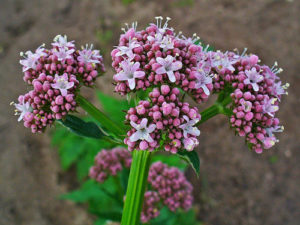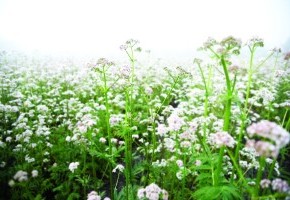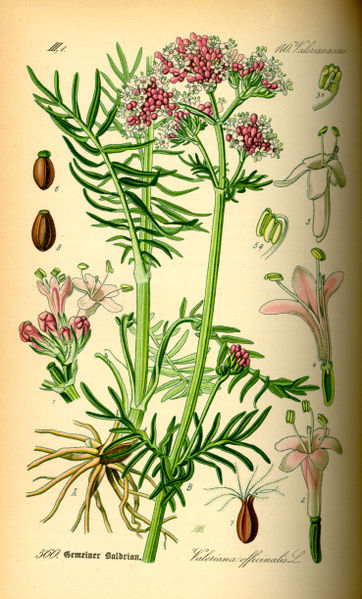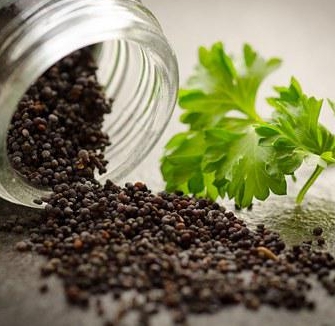Legend has it that the Pied Piper used valerian to lure rats out of the city of Hamelin. It can be used as rat bait today but it is more commonly used as a sedative.
During WWI it was given to soldiers to help treat shell shock and given to civilians to help relieve stress. Valerian is the most commonly used nonprescription sedative used in Europe today. In Germany it is more likely to be recommended than Xanax.
It helps calm the nerves, relaxes the muscles, and increases the blood flow to the heart. Valerian is sometimes referred to as the “daytime sedative” as it can help improve concentration and memory during the day but can help one sleep more sound during the night.
For many valerian can have a warming relaxing effect, however for those who already feel over heated it can cause a stimulating effect rather than sedating. This herb can be very beneficial for the right person but may not be the right fit for everyone.


(http://www.motherearthliving.com/natural-health/valeriana-officinalis-grow-valerian-natural-sleep-aid.aspx#axzz36F1n5Nsp)
GROWING NOTES
Valerian grows to a height of 3-4′ and begins blooming early in the season, sometimes in late spring. The pink and white flowers grow in clusters and are favorite of many types of insects.
Valerian favors full sun and a humus rich soil, and lots of water.
MAINTAINING
Can be direct sown outdoors in early spring, or started indoors 4 weeks prior to transplanting in late spring. Small seeds can be tamped into the soil or covered with a thin layer of soil, approximately 1/4″, and should germinate within 7-14 days with moist but well-drained potting mix.
HARVESTING
Root can be collected in the fall. Valerian can sometimes be collected in the first year, but will often require at least an additional year to reach sizable quantities worthy of collection.
(http://www.heirloom-organics.com/guide/va/guidetogrowingvalerian.html)

(Valerian botanical drawing by Prof. Dr. Otto Wilhelm Thomé)
MATERIA MEDICA: VALERIAN
Latin Name: Valeriana spp., including V. officinalis
Family: Valerianaceae
Parts Used: Root, rhizome
Actions: Anodyne, anthelmintic, antibacterial, antispasmodic, aromatic, astringent, bitter, carminative, diaphoretic, diuretic, febrifuge, hypnotic, hypotensive, nervous system tonic, nervine, restorative, sedative, smooth muscle relaxant, stomachic, tonic.
Preparation and Dosing:
- Tea – steep 1-2 teaspoons in 12 oz hot water for 10-15 minutes. Drink 1-2 hours before bed time to help calm the system
- Tincture – 60-90 drops in a small amount of water, 1-2 times in the hour leading up to bed.
*note: Valerian has a very particular smell and taste, some find it pleasent, others not so much…feel free to add to something other than water to mask the taste if you find it not to your liking.
Uses: Addiction, aggressiveness, anxiety, arthritis pain, attention deficit disorder, chorea, convulsions, cough, delirium tremens, dysmenorrhea, epilepsy, flatulence, flu, headache, hypertension, hyperactivity, hypochondria, hysteria, inflammatory bowel disorder, insomnia, intestinal cramping, mental illness, migraine, muscle pain, nervousness, nervous breakdown, neuralgia, overeating, pain, premenstrual syndrome, restlessness during illnesses such chickenpox, shingles, shock, stress, tachycardia, traumatic injury, vision weakness and worms.
Cautions:
- Do not use large doses for more than three weeks in a row. Small nightly doses are typically fine.
- Do not give to children under the age of three.
- Avoid during pregnancy, except in small doses.
- Use with caution if driving heavy machinery or doing any other activities that may require a quick reaction time after taking valerian.
- Avoid long term use of valerian in cases of depression.
- Large doses of valerian can cause depression, nausea, headache, and lethargy.
- Some people experience the opposite effect with valerian, in otherwords it keeps them up at night. This happens with about 25% of the population, so it’s best to try valerian for the first time on a night when you don’t have much to do the next day in case you are someone this happens to…otherwise you’ll have a great night’s sleep!
~Written by Apothecary intern Risa Palmer~


